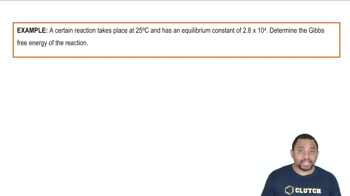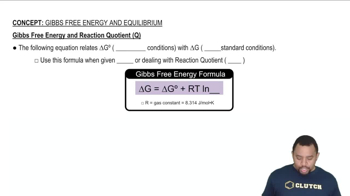Gibbs Free Energy And Equilibrium definitions Flashcards
 Back
BackGibbs Free Energy And Equilibrium definitions
1/11
Terms in this set (11)
- Gibbs Free EnergyA thermodynamic quantity used to predict the spontaneity of a reaction under constant temperature and pressure.
- Equilibrium ConstantA dimensionless number that expresses the ratio of product concentrations to reactant concentrations at equilibrium.
- Standard ConditionsConditions where reactants and products are in their standard states, typically at 1 atm pressure and a specified temperature.
- Reaction QuotientA ratio of concentrations of products to reactants at any point in a reaction, used to predict the direction of change.
- Gas ConstantA physical constant denoted as R, with a value of 8.314 J/mol·K, used in various thermodynamic equations.
- SpontaneityA measure of whether a reaction will occur without external input, often indicated by a negative Gibbs free energy.
- ThermodynamicsThe branch of physical science that deals with the relations between heat and other forms of energy.
- JoulesA unit of energy in the International System of Units, used to quantify energy, work, or heat.
- KelvinThe base unit of temperature in the International System of Units, used in thermodynamic equations.
- Standard Gibbs Free EnergyThe change in Gibbs free energy under standard conditions, denoted as ΔG°.
- Non-standard ConditionsConditions that differ from the standard state, affecting the Gibbs free energy of a reaction.



